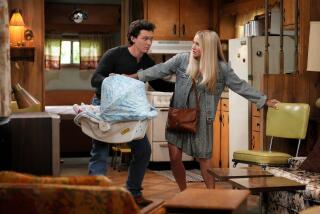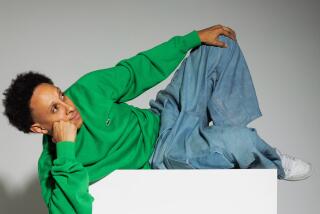Review: With âThe Neighborhoodâ and âHappy Together,â CBS offers two comedies of upsetting proximity
CBS has two new sitcoms premiering Monday to put on your New CBS Sitcom list. Each concerns what happens when a person or persons move next to or in with some different, dissimilar persons. (In each case, one party is black and the other white, though race is only a subject in one show.) Each coincidentally stars someone who used to be on Foxâs âNew Girl.â
And apart from the lately departed âSuperior Donuts,â in which Jermaine Fowler costarred with Judd Hirsch, they are the first CBS situation comedies with black leads to premiere in more than 20 years, after the short-lived âThe Gregory Hines Showâ in 1997 and the longer-lived âCosby,â which ran from 1996 to 2000. Make of that what you will.
In the weightless âHappy Together,â which does use the old Turtles song as a theme, Damon Wayans Jr. (our âNew Girlâ alumni) and Amber Stevens West play Jake and Claire, a couple in their early 30s who take in a hot Australian pop star named Connor (Felix Mallard) when a tabloid breakup sends him looking for a place to hide. (Jake is his accountant.)
Although it is based on the real-life experience of executive producer Ben Winston, in whose attic One Direction singer Harry Styles (since gone solo, also an executive producer) lived for 18 months, itâs a familiar king-among-commoners theme. It also resembles, in different ways, both âBye Bye Birdieâ and âAlf.â
The main effect of Cooperâs presence is to make Jake and Claire feel old and to proclaim that they are not (âWeâre young and fun and full of beansâ), though they have settled into a comfortable couch-bound, binge-watching, snack-eating Saturday night groove.
Jake: âWe are living with a world famous rock star. We cannot let him see us go to sleep at ... 9:25.â
Claire: âWell, it canât be worse than the time he saw us high five over a coupon.â
Jake, especially, is concerned with looking cool to Cooper, which he does not accomplish by saying weird things in funny voices (saying things in funny voices is a bit of Wayans Jr. thing), mentioning repeatedly that his nickname in college was Dr. Dunk (âItâs a life titleâ) and compulsively referring to Cooper by nicknames like âCooper Gooding Jr.â and âCooper Noodles.â
Cooper, for his part, likes that Jake is âan ordinary guy, living an ordinary life in a totally ordinary place.â
Nothing particularly interesting is done with the premise; Jake and Claire go out clubbing with Cooper and it destroys them; in another, Cooper puts them on a pop star health regimen; in another, his lack of possessions inspires them to try to de-clutter their lives. Though he sometimes gets a funny line (âIâm sorry, guys. If Iâd known the lyrics to âShake Your Booty, Yeah Yeahâ would cause so much pain, I never would have written themâ), he is essentially a straight man, a catalytic agent. But Wayans and West develop an increasingly comfortable rapport as the episodes go on, and West is enjoyable all the way through, funny without breathing hard.
âThe Neighborhoodâ is more substantial â there are more characters in it, anyway, and a splendid main set representing the facade and yards of two side-by-side Southern California Craftsman bungalows that feels less like a multi-camera sitcom than legitimate theater. (The interior details are right too.) It has political points too, about diversity and unity, preservation and gentrification, which are simultaneously emphasized and danced around. Stripped down to its essentials, itâs a familiar sort of comedy about a person who would like to be left alone and the person who wonât leave him alone.
Max Greenfield (âNew Girl,â there it is) plays Midwest-friendly Dave Johnson, a professional conflict mediator moving his family from a small town in Michigan into a predominantly black neighborhood in northern Pasadena; his wife, Gemma (Beth Behrs), has a job running a progressive school nearby. (They are also packing a young son, Grover, played by Hank Greenspan.)
Soon-to-be-neighbor Calvin Butler (Cedric the Entertainer), meanwhile, associating the name Johnson with Magic and Dwyane, has been happily expecting âanother successful black family moving into that nice houseâ next door. His awakening is rude; awakening, he is rude too.
âYou let one family like that move in,â Calvin declares, âand the next thing you know, itâs going to be a bunch of dudes jogging around in their little short-shorts walking their vegan Labradoodles.â (There will be shorts.)
Having barely unpacked, Dave wants to give Calvin a key to his house, because âWhat if thereâs an emergency or you want to borrow something and weâre not home or itâs my birthday and you want to surprise me with a surprise birthday party?â (âLike Iâm going to help him in an emergency,â sniffs Calvin, who meets Daveâs warmth with wariness: âThere are two types of racists; thereâs ones who hate black people, and ones who love black people.â)
In some ways, Greenfield is playing a less intense if no less needy version of Schmidt, his manic âNew Girlâ character (a more intense version of Schmidt can scarcely be imagined). Indeed, there are times when the show itself comes on to the audience in the way that Dave leans in on Calvin, forcing an intimacy it hasnât earned yet. (As a professional mediator, he is peculiarly bad at reading people and also given to sulks; this is possibly meant to be ironic, or it might just be a case of consistency sacrificed on the altar of comedy.)
If Dave can seem too weird to be true, the Butler family represents a dynamic so familiar to situation comedy as to seem practically real. Cedric the Entertainer easily plays the part of grumbling patriarch, with solid work from Sheaun McKinney as his unemployed older son, Malcolm, who lives at home; Marcel Spears as younger son Marty, who has a job and an apartment but is always around the house, because thatâs where the show takes place; and Tichina Arnold as Calvinâs well-centered wife, Tina. This is not the first comedy in which sensible wives bond while excitable husbands clash, and it will not be the last.
The premise is a flip, of course, on the old cry of the Racist White Homeowner, âThere goes the neighborhood,â unleashing jokes, and a speech or two, about how black people are and white people are, and how they see one another. (In fact, these are issues that have concerned the actual gentrifying, house-flipping neighborhood where the show is set.) But this is also a TV neighborhood, where the âcommunityâ for all intents and purposes extends no farther than the people next door â not even the people next door on the other side.
This may change: In the fourth episode, Calvin visits a local bar, where he laments to his friend the proprietor that âour community is being chipped awayâ and that the old barbecue joint and the hardware store have become a coffeehouse and a juice bar; Dave will also get a lesson in real local history that applies to locales all over this land. Of course, he will have something to teach Calvin too, about trust and acceptance. On CBS, everybody gets along, eventually.
ALSO:
Cedric the Entertainer is bringing authenticity to CBSâ âThe Neighborhoodâ
In a changing Pasadena neighborhood, a âGentrification Conversationâ
âNew Girlâsâ Max Greenfield talks Schmidtâs growth, Kevin Reilly exit
Jerrod Carmichael doesnât want his comedy to get âswept up in a hashtagâ
âThe Neighborhoodâ
Where: CBS
When: 8 p.m. Monday
Rating: TV-PG-DL (may be unsuitable for young children with advisories for suggestive dialogue and coarse language)
âHappy Togetherâ
Where: CBS
When: 8:30 p.m. Monday
Rating: TV-PG (may be unsuitable for young children)
Follow Robert Lloyd on Twitter @LATimesTVLloyd
More to Read
The complete guide to home viewing
Get Screen Gab for everything about the TV shows and streaming movies everyoneâs talking about.
You may occasionally receive promotional content from the Los Angeles Times.







